By ELIZABETH LOLARGA
Photos by KIMI FERNANDEZ
NEWBIE author Baboo Mondoñedo has reason to meet each morning with a full smile on her face these days. She has lived a colorful, challenging life long enough to see a dream nurtured in her youth realized: the publication by the University of Santo Tomas Publishing House of her first book of personal essays, Stepping Stones. She also painted the works that served as cover art and interior illustrations.
At her launch at Baguio’s Café by the Ruins, she quietly signed copies of her book and let her voice be heard through colleagues in the writing profession (Luchie Maranan, Desiree Caluza, Nonnette Bennet and Laarni Ilagan), who read excerpts from her works, and through only child Tootsy Echauz-Angara who once asked of Mondoñedo, “What makes you happy?”
The answer was vintage Baboo (the name her three grandchildren call her and by which she’s known in media, environmental and art circles): what she lacked in romance and a typical happy family, heaven made up for by blessing her with good friends.
Echauz-Angara said, after her mother presented to her and her own daughter Ines copies of the book in a symbolic turnover of one generation to the next, that Mondoñedo’s life has been fraught with challenges from childhood, but it has also been rich and full. She spoke openly of her mom’s affairs of the heart that could easily fill up another two or three more books similar to the novel Bridges of Madison County.
She thanked the Baguio community members who were present “for “being part of her life,” including those who “gave her joy, laughter, heartache—without those she wouldn’t be the Baboo we know today.”
She called her mother “the moral compass of my life who keeps my feet on the ground” and thanked her repeatedly for “being tough with me that gave me the courage to overcome my own challenges gracefully.”
In her essay “Coming Full Circle,” Mondoñedo has come to view her daughter today in a different light: “Lately, I have noticed that she has started to mother me. She pushes me to see the doctor and have regular check-ups. She watches my diet but at the same time indulges me with my favorite food. She dresses me up and gives me fashion advice. She is supportive and takes care of things. Through time, my mother and my roles have reversed as my role with my daughter has reversed as well.”
Mondoñedo moved to Baguio with her daughter immediately following the assassination of Sen. Benigno Aquino Jr. in 1983 after she quit her job in disgust at the defense department where she had organized a human rights desk. What followed was years of activism.
In “The Tricks Memory Plays,” she wrote how Tootsy was only nine when they joined a media group to witness a peace pact meeting in Kalinga. But their recollections of how long they were detained at a military checkpoint differed.
Mondoñedo wrote: “They made us remove our shoes and socks. All our bags and cargo were inspected. Tootsy was afraid the soldiers would look at her notebook where she had written on a page, ‘Ibagsak si Marcos.’ When she remembers the incident, she says, ‘We were held for days.’ But to me, we were only detained for one long afternoon until sundown…”
Her immersion in Cordillera culture enabled her to appreciate the food and how indigenous people are “more advanced and newer than New Age” when it came to environmental protection: “[T]hey take only what they need and they share. Nature was never for commerce. It is viewed as a source rather than a resource.”
 Fellow writer-painter Merci Javier-Dulawan recalled how in 2010, Mondoñedo asked her help in meeting the conditions she needed to come up with a book-length manuscript: time, resources to give her freedom to write and a smart computer. Javier-Dulawan, who was Echauz-Angara’s fourth-grade teacher, was at first daunted, thinking, “How does someone teach a writer how to write?”
Fellow writer-painter Merci Javier-Dulawan recalled how in 2010, Mondoñedo asked her help in meeting the conditions she needed to come up with a book-length manuscript: time, resources to give her freedom to write and a smart computer. Javier-Dulawan, who was Echauz-Angara’s fourth-grade teacher, was at first daunted, thinking, “How does someone teach a writer how to write?”
She marveled at how Mondoñedo arrived at “formula for success that we can all learn from: she had a dream; she committed to holding on to that dream, no matter how long it took to realize it; and she worked hard to make the dream come true.”
That afternoon, the café, where Mondoñedo is a founding partner, transformed into a folk house that the city is known for as singer after singer serenaded the audience with Bob Dylan, Leonard Cohen, Beatles and samba songs all familiar to her fellow travelers.
These travelers had learned her life lesson of “giving of ourselves with pure intent and a full heart.”
Stepping Stones will be re-launched March 12 at 6 p.m. at the National Bookstore branch in Glorietta 1, Makati City.#
